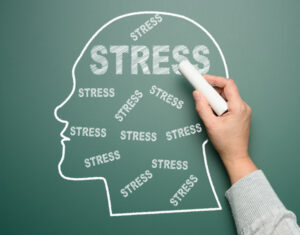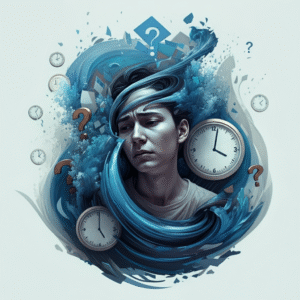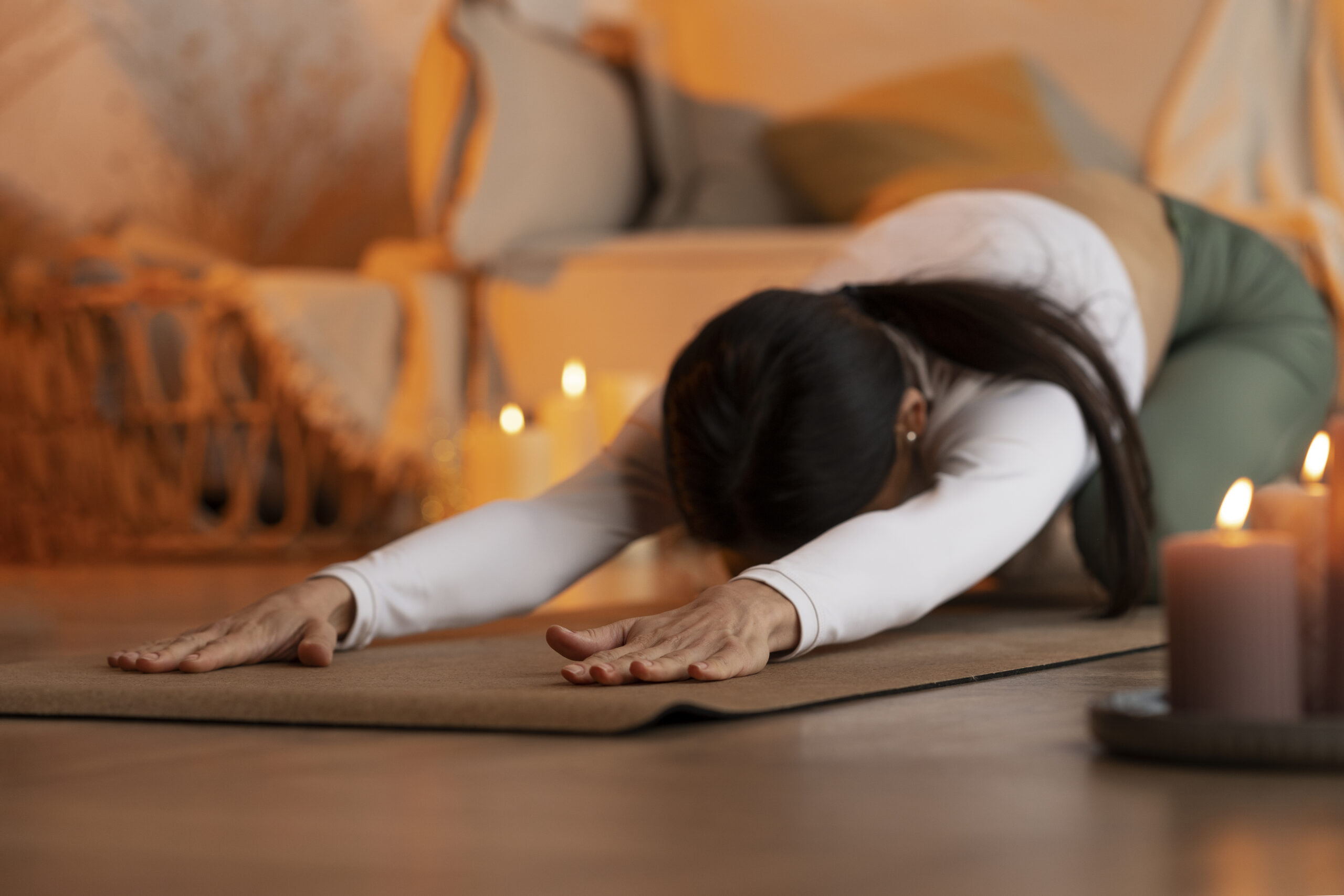Stress affects everyone, but it can be confusing and overwhelming. What is stress, then? Simply put, stress is the body’s natural response to a situation or a demand. It prompts you to act. But if stress is persistent or excessively high, it may impact your sleep, mood, and focus. This easy-to-follow guide will explain the types of Stress, the most common signs of Stress, physical symptoms of Stress, as well as the major causes of Stress, the relationship between Stress and anxiety, and practical Stress Management Strategies. At the end of this guide, you’ll know how to deal with Stress and discover simple and effective Stress relief Tips that work.

What Is Stress?
The first step is to define it clearly. Stress is a mental and physiological response to stress. If a deadline is near, your heart rate increases, as does your breathing, and your brain gets sharper. The short-term boost in energy can aid in your performance. But if the pressure does not ease, your body is “on,” which can take away your energy and affect your mood. Understanding stress and your stress patterns can help you select better ways to respond instead of being stuck.
Types of Stress
Although stress can be similar to other types of stress but it’s not all identical. Take a look at three different kinds of stress:
- Acute stress is a temporary condition and is connected to a specific occasion, such as a job interview. It typically fades after the event has passed.
- Episodic acute stress occurs when stressors that are short-term stressors pile together in a series. Because one spike is followed by another, you could experience a sense of edginess or rush frequently.
- Chronic stress refers to continuous stress caused by ongoing issues like financial stress or conflict. In time, chronic stress can bring down both physical and mental health.

Understanding these types of stress can help you adapt your strategy. If you experience a short spike, an exercise in breathing may suffice. For ongoing strain, you may need deeper lifestyle changes.
Stress and Anxiety: How Are They Different?
Stress and anxiety frequently appear as a pair; however, they’re not the same. Anxiety is typically triggered by external triggers a test, a hard talk, or a busy schedule. But anxiety may persist even if the cause isn’t apparent. In addition, anxiety can bring worry or a feeling of fear. Since stress can trigger anxiety, managing stress earlier will reduce the chance of spirals of anxiety. If anxiety is frequent or intense, you should talk to a specialist for more help.

Signs of Stress
Since stress can affect both the body as well as mind, you might observe it in your behavior, thoughts, mood, and energy. The most common signs of stress are:
- Overwhelm, irritability, or a low level of motivation
- Problems concentrating or making decisions
- Sleeping patterns that are too few or too many
- Emotional swings, or feeling “on edge”
If you see these patterns, stop and examine yourself. The first step is to recognize stress. A step to manage it.
Physical Symptoms of Stress
Stress can also leave traces in the body. The physical symptoms of stress could include:
- Jaw tension, headaches, or tight shoulders
- A stomach upset, nausea, or a change in appetite
- Heartbeats that are faster or shallower
- Chronic colds or fatigue
Because symptoms may be caused by other factors, you should consider the context as well as the duration. If symptoms continue, consult medical professionals to rule out any other possible causes.
Causes of Stress
The Causes of Stress vary; however, some themes are common:
- Time pressure and workload
- Financial concerns or debt
- Conflict in relationships or caregiving obligations
- Uncertainty about health issues or the future
- Significant life changes, and even positive ones

It is important to consider your perception. Two people could be confronted with the exact same scenario, yet respond differently. It is therefore important to know your individual stress triggers. These include signs like being too busy, not eating, or even scouring the internet late in the midnight.
Stress and Mental Health
Stress as well as Mental Health are closely linked. Stress can increase the chance of depression, and anxiety can reduce motivation, as well as affect relationships. However, healthy mental health practices, like regular sleep, regular exercise, and connections that support your body from stress. As a result, consider mental health hygiene as similar to dental care; simple, consistent actions can prevent more serious issues later on.
Stress Management Techniques
You can improve your ability to manage stress. Here are the most scientifically-proven Stress Management Techniques you can apply to your daily routine:
- Breathing exercises: Try the 4-4-6 method. Breathe through the nose and inhale for four seconds, and exhale through your mouth for six. Repeat this for 2 minutes to relax your nervous system.
- Food for movement: Walk for 10 minutes, take a stretch of your hips and chest, or try a quick series of squats. Exercise helps to burn off stress hormones and improves mood.
- Reframe your thought: If you are faced with a terrifying thought, think about: “What’s the most likely outcome?” Then write down an appropriate next step. This helps you move from contemplation to solving problems.
- Concentrate sprints: Complete the task in 25-minute segments with 5-minute breaks. Short sprints can reduce stress and make big projects doable.
- Micro-boundaries: No extra task for today. Close email at set times. Disable notifications that are not essential. Limits of a small size can protect your energy and attention. Say no by setting boundaries for your mental health.
- Sleep anchors: Maintain consistent wake-up and wind-down times. At night, dim the lights and avoid screens for 60 minutes before bedtime to ensure a more restful sleep.
How to Deal with Stress Day-to-day
Since consistency wins over intensity, incorporate the following into your routine:
- Morning check-in: List your top three priorities and one non-negotiable personal item (water or a walk lunch at your desk).
- Midday reset: Go outside, breathe in a slow, steady breath, and try to get some sunlight if you can. Even five minutes of sunlight can help.
- Relax in the evening: By writing down your concerns and plans for the day ahead, and then performing some stretching in the sun, reading, or taking the comfort of a hot shower.

Also, drink plenty of water by consuming whole food choices, and reduce caffeine consumption late in the morning. These easy steps can increase the resilience of your base.
Stress Relief Tips You Can Use Right Now
If you need immediate relief, you can try these Stress Relaxation Tips
- Box breathing: Inhale and exhale 4. Hold 4 for 4 seconds, then exhale, hold 4. Repeat four times.
- Sensory grounding: Identify five things that you can see and feel. Four of them are three things you hear, two things you can smell, and one that you can taste.
- Connection signal: Text a friend and share one thing you like about them and one issue, and ask for some advice.
- A dose of laughter: Watch an enlightening short video that makes you smile. Humor relieves tension and increases mood.

If you feel that your stress is linked to a specific issue, write the issue at the top of the page. Then, you can list three options, select one, and complete it within an hour. This will reduce the sense of anxiety.
When to Seek Extra Help
Sometimes, self-help doesn’t work, and it’s fine. If stress has been affecting your day-to-day life for several weeks, or you experience anxiety, constant insomnia, or thoughts of self-harm, contact an experienced professional licensed to practice. Coaching, therapy, and community support may offer you the tools and perspectives you don’t have to be on your own.

Stress is a part of being human; however, it doesn’t have to control the show. If you know what stress is and the different types of Stress and the relationship between Stress and anxiety, and the typical signs of Stress and physical symptoms of Stress and Anxiety, you’ll be able to respond earlier. With the help of practical Stress Management Methods with clear guidelines on how you can cope with Stress and easy Stress Relief Strategies to develop habits that help you maintain your health and assist in achieving your goals. By following the steps, you’ll feel more relaxed and clearer. You’ll feel more at ease.



